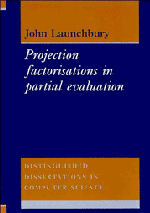Project Factorisations in Partial Evaluation
A partial evaluator is a function that takes a program, together with some of the input to the program, and produces a new program as a result. This new program is an optimized version of the old, having taken the input data into account. Prior to partial evaluation, the input program undergoes analysis. This binding-time analysis discovers which values within the program may be computed during partial evaluation--the static values--and which may not--the dynamic values.
Partial evaluation has recently become the focus of attention for a rapidly increasing number of researchers because of its potential for global program optimization. It provides a detailed introduction and proceeds to a mathematical treatment of the technique. It is relevant to people interested in automatic program transformation, program optimization, compilers, program analysis, and theoretical computer science. This is the first complete book on the subject of partial evaluation.
Reviews & endorsements
"...a fascinating blend of a long pragmatic tradition in the art of writing partial evaluators with ML-style polymorphism and a dash of categorical concepts. The writing is exceptionally good and so I recommend this book also as a fine place to learn about partial evaluation." David B. Benson, Mathematical Reviews
Product details
May 2012Adobe eBook Reader
9781139242943
0 pages
0kg
This ISBN is for an eBook version which is distributed on our behalf by a third party.
Table of Contents
- Abstract
- Preface
- 1. Partial evaluation in principle
- 2. Partial evaluation in practice
- 3. Static projections
- 4. Binding-time analysis
- 5. Run time arguments
- 6. Implementation
- 7. Polymorphism
- 8. Conclusion
- Appendices
- Bibliography
- Index.


